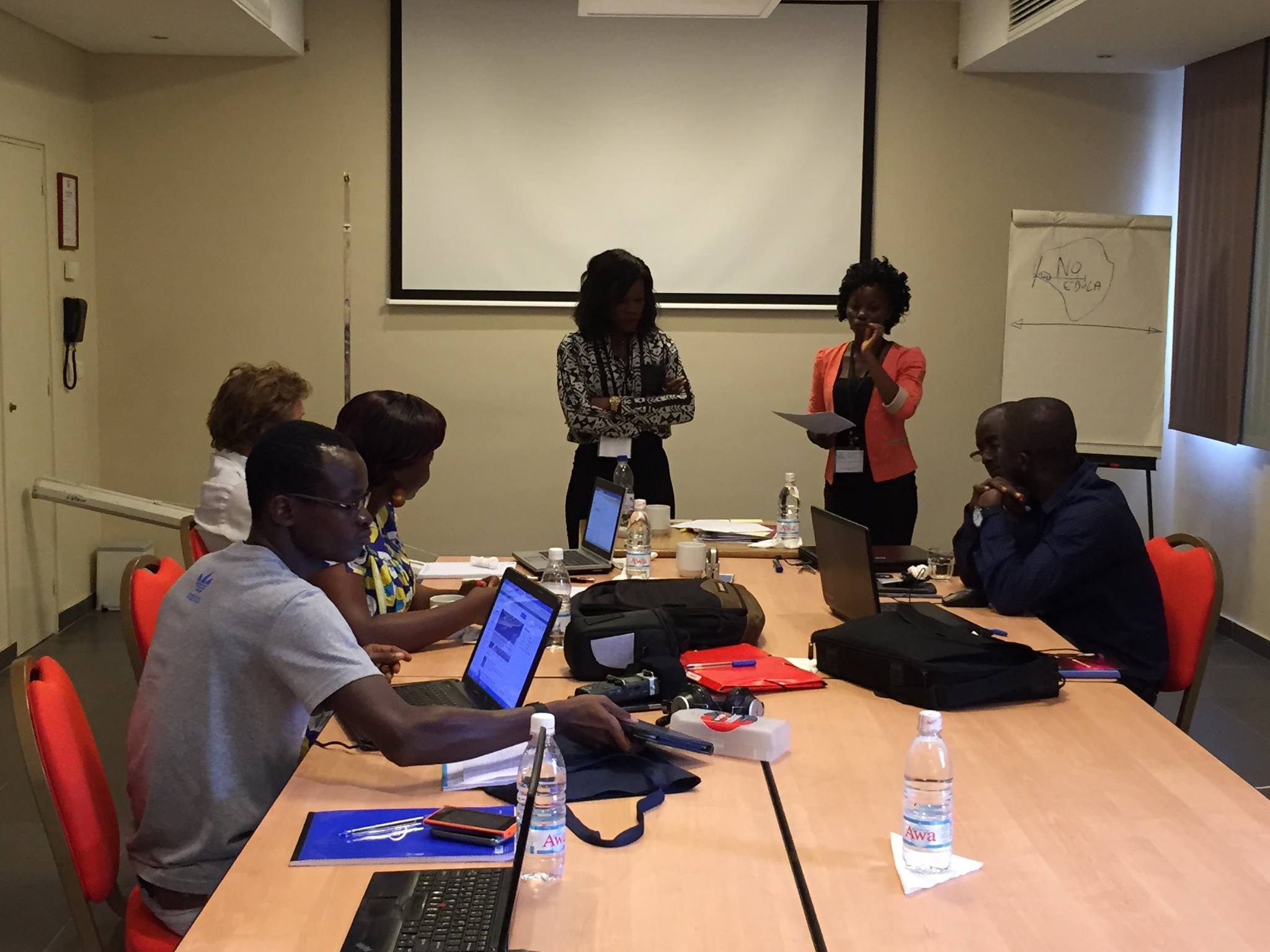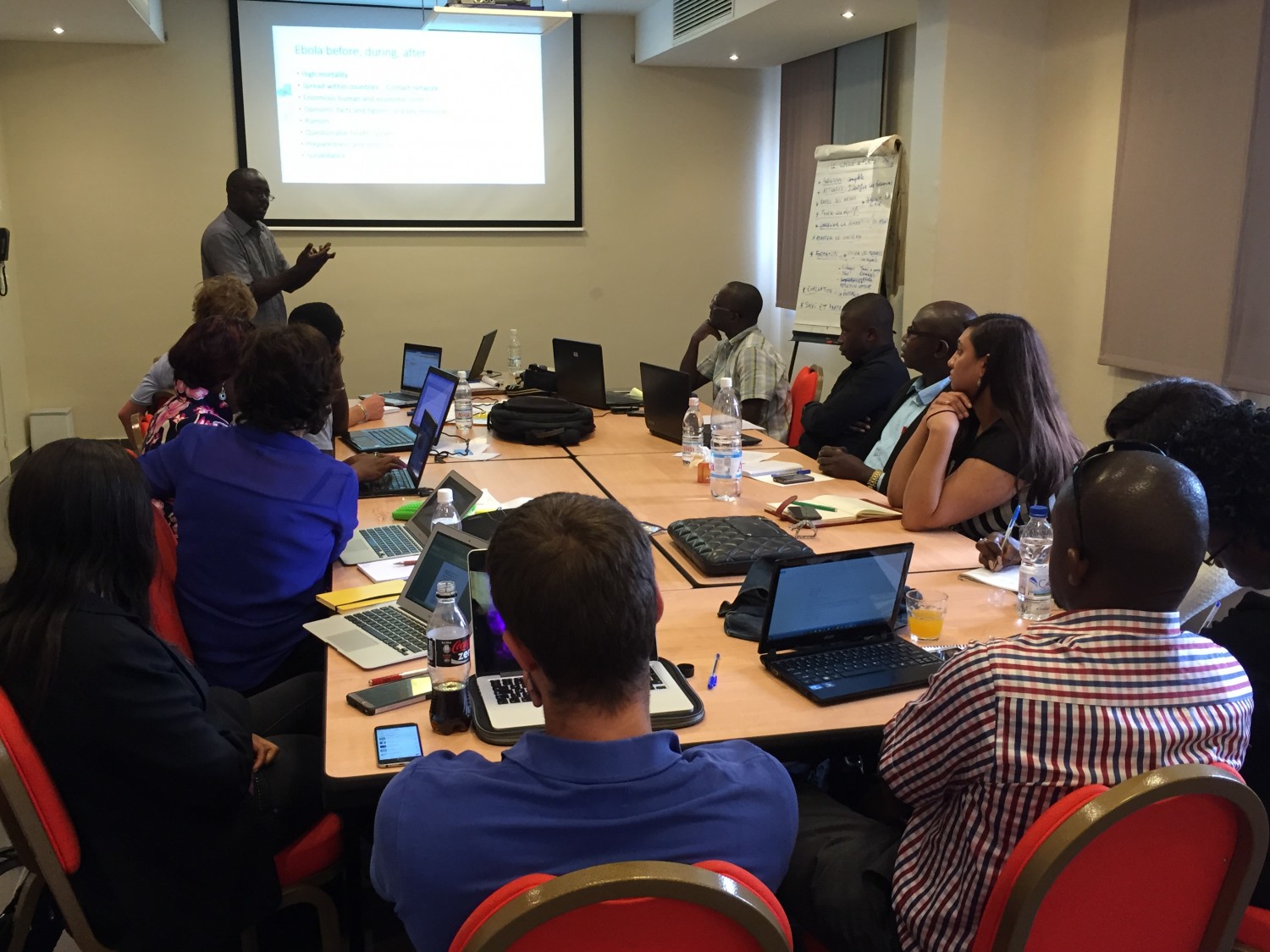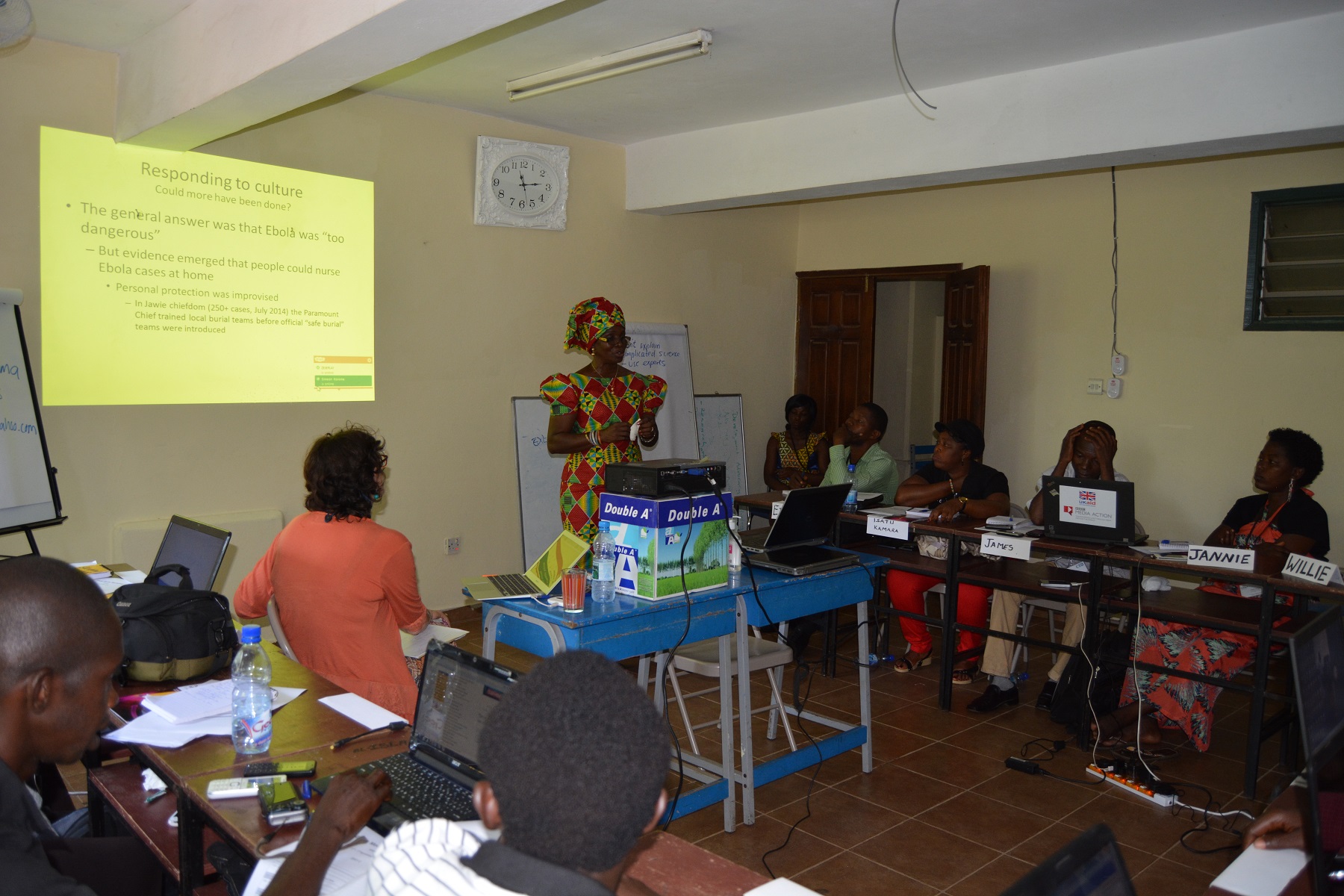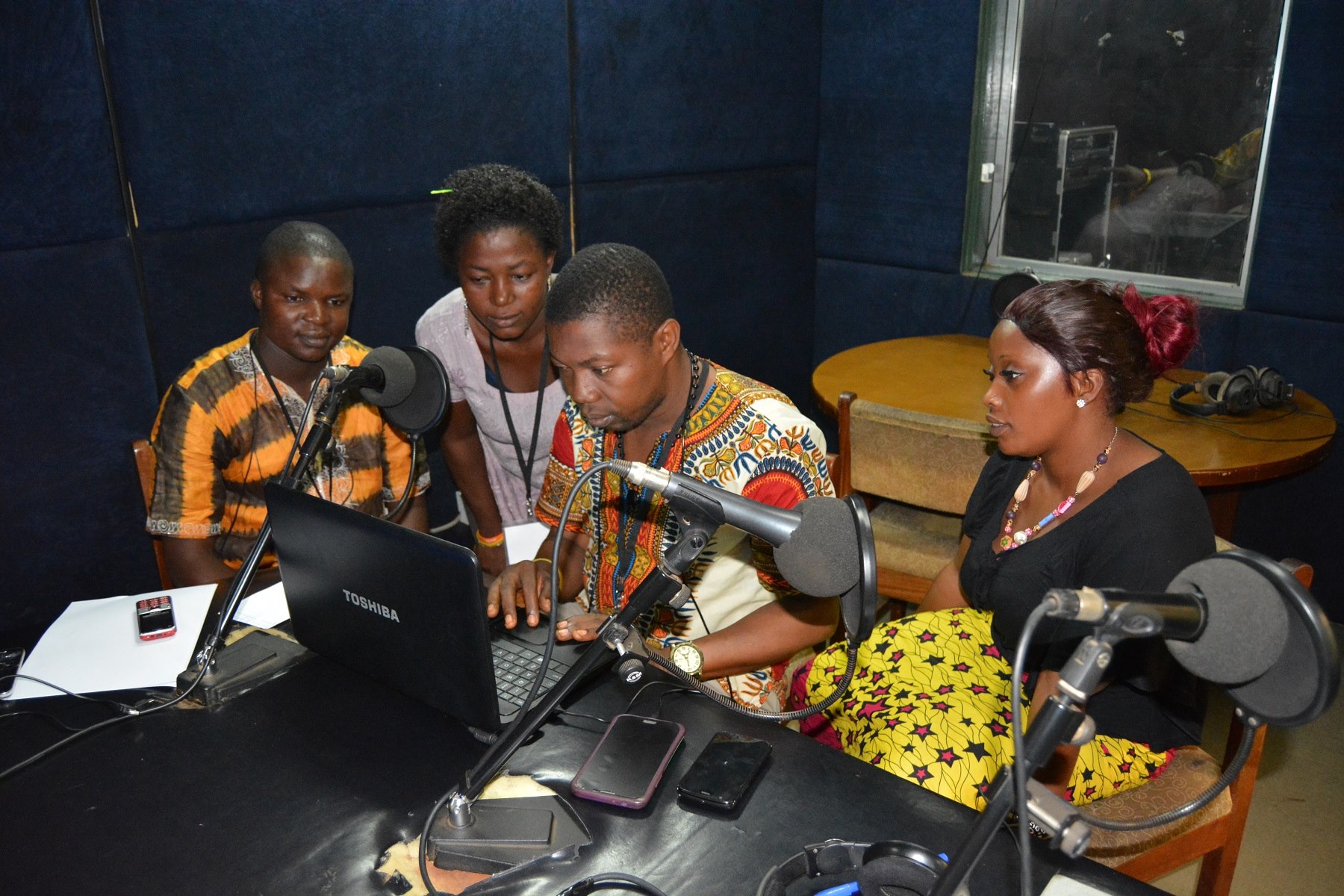The worst Ebola outbreak in recorded history has already claimed the lives of more than 11,000 people across West Africa. Many deaths could have been prevented: local communities did not know enough about the disease and how to stop its spread. An ambitious new programme aims to train local journalists how better to inform and educate their communities in order to keep them safe. Science journalist and broadcaster, Serusha Govender, reports.
Bar the frontline health workers and scientists working to fine-tune at least two possible new Ebola vaccines, the overall response to the epidemic was initially lethargic and from then on mostly confusing, disjointed and conflicting.
Deep flaws were revealed in overburdened (and now crippled) local health systems in the affected states of Guinea, Liberia, and Sierra Leone.
Shoddy communication strategies did not help.
And major bodies, like the World Health Organisation, can’t escape criticism either. They were wholly unprepared to process or cope with a public health emergency of this magnitude, particularly in the developing world.
Shoddy communication strategies did not help. Scientists across the world weren’t always exchanging information efficiently with each other or their counterparts in the field. Doctors in the Ebola Treatment Centres (ETCs) weren’t properly explaining to communities what went on behind the white-partitioned walls where the infected were being quarantined. Local politicians were mostly not speaking to anyone at all for fear that the mushrooming epidemic would reflect poorly on their office.
Communities grew steadily more distrustful of the ‘outside’ information they were getting and deferred instead to traditional healers and community leaders.
Then in late 2015, as the valiant efforts of frontline healthcare workers started to make real progress in reducing the rate of transmission and the new Ebola vaccine was moving into human trials, the World Federation of Science Journalists (WFSJ) launched an innovative multi-phase programme. Their highly-skilled science journalists from across Africa would train and work with community reporters in some of the most hard-to-reach and worst affected Ebola regions.
The training will help local reporters in understanding and processing the constantly evolving information.
The best way to kick-off this ambitious project was in situ, by bringing a group of science journalist-trainers to West Africa to knuckle down a strategy. So, on a balmy September afternoon in downtown Abidjan, Ivory Coast, a group of us (English-speaking in this room, French-speaking journalists next door) were trying to do just that.
The International Development Research Centre’s senior programme specialist Thierry Baldet talked us through the current Ebola vaccine trials in West Africa, a vaccine he personally had a hand in creating. From the work on this version of the vaccine – the rVSV-ZEBOV currently being commercial developed by pharmaceutical giant Merck and biotech firm NewLink Genetics – to the human trials and subsequent rollout, Baldet is determined to break it all down as simply as possible. The hope is that if we can explain the treatment to community journalists in Ebola-affected areas who will then in turn inform others, more people will consider full vaccination. Only then can we eventually get down to a zero-case scenario for the disease.
The aim is to combine the training and experience of this group of journalists – the research skills, the familiarity with scientific method, the experience cultivating scientific sources for information and curating reliable information – with the deep knowledge these local reporters have of their communities, the cultures and customs, and the trust that communities have in them and the information they provide. Essentially the training will help local reporters in understanding and processing the constantly evolving information. They will be able to create messages for prevention and best practices and tailor all that to each community so that it’s understandable, reliable and easy-to-follow.
This first phase in Abidjan gave the team a chance to build a template for a series of workshops that would target radio journalists in affected communities. The training would be a combination of scientific teaching, accessible breakdowns in understanding basic medicine and vaccines, exercises and a practical course for pulling together a full radio show on a topical Ebola story with multiple scientific sources in a just a couple of days. Subsequent workshops with radio journalists have been run in Sierra Leone, Guinea and Liberia, and the results have been incredibly positive.
While vaccines and the medical theory around infectious diseases proved difficult to digest, understandably, the participating community reporters were eager to learn and brought with them a solid understanding of their communities’ needs and fresh ideas on some of the challenges and solutions.
‘Interacting with these journalists has given us so much perspective,’ says project manager Anouk Beauvais. ‘In one of the workshops one of the journalists was a guy who was married to an [Ebola] survivor… there’s a lot of hands-on experience dealing with Ebola and the trauma of the communities.’
Survivors have more struggles than just re-infection though. Many are going back to communities devastated by the outbreak.
An added challenge is not actually ‘de-science-ing’ the processes, but stopping rumour and misinformation: can drinking salt water cure Ebola? What about that special Guinean onion, it can prevent infection, right? Heard the one about Ebola survivors that rise from the dead like zombies? So, for the record, the answers are no, no, and absolutely no! But while some rumours are sublime and others are ridiculous and easy to dismiss, some can perhaps seem possible with a tiny kernel of truth which can mislead many reporters.
Reporters will also have to deal with the evolving information regarding Ebola survivors. Doctors are still not entirely sure how long the virus can stay alive and remain contagious in Ebola survivors. It should be 21 days but now we try to make sure you test negative for a full 42-day period with further monitoring for 90 days after recovery. New research shows the virus can actually survive much longer, sometimes, in the semen and so can still be passed on. And it is reported that a US doctor, working in the field during the epidemic, tested positive for the virus in his eye (yes, eye) months after getting a negative blood test.
There will also be an interactive digital element and a focus of building a strong network of science journalists across Africa.
Survivors have more struggles than just re-infection though. Many are going back to communities devastated by the outbreak. Most have their families, friends and neighbours, and most will have terrible secondary health problems as a result of their Ebola infection (like blindness) and will likely need constant medical care and help coping with their post-traumatic stress.
In 2016, phase two of this project will gear up. It will look at the logistics of rolling out the training so the rest of the region can also benefit when there are infectious disease outbreaks. There will also be an interactive digital element and a focus of building a strong network of science journalists across Africa. A web-platform is in progress, as well as a digital toolbox for community journalists to access anywhere, and online courses reporters can take to improve their infectious disease knowledge base. Since the WFSJ is a non-profit, the biggest hurdle for projects like this is funding but, as more partners come on board, the endeavour will expand across the region.
Given a lack of time and resource, it’s not entirely possible to train every single community journalist in the region at one of these workshops. But the approach – using specialised and experienced journalists to train their less experienced counterparts – is a solid one that’s proved effective.
These newly trained reporters can take those lessons back to their communities, teach these skills to their colleagues and help add to the network that will, hopefully, end up significantly boosting science journalism capacity and capability across the whole continent. This way, when the next health emergency erupts, the region will be in a much stronger position to self-manage the fast and effective flow of accurate information without complete reliance on international organisations. Stopping Ebola is about more than just finding a vaccine.
Photographs courtesy of WFSJ




